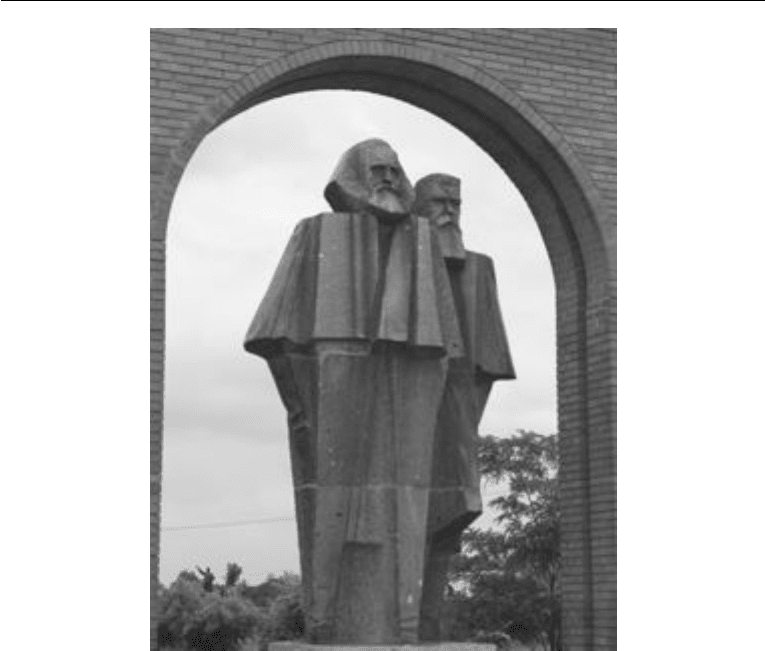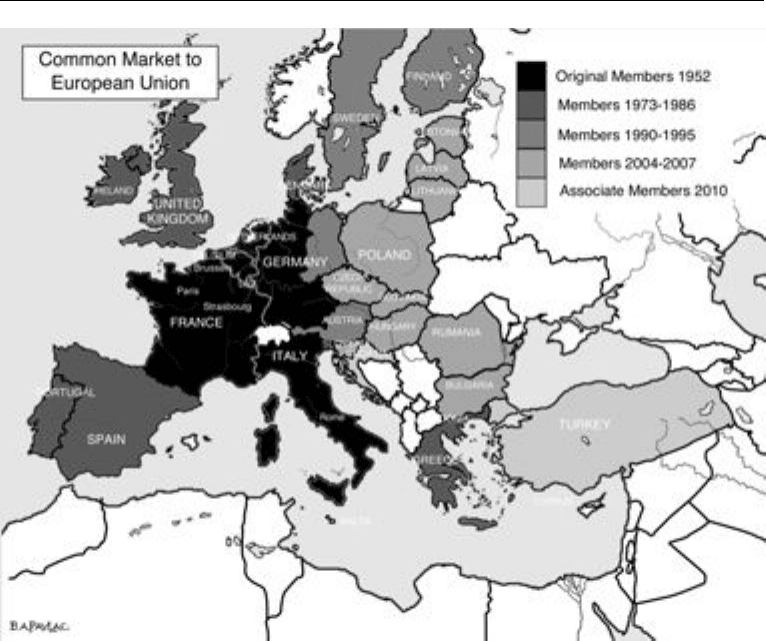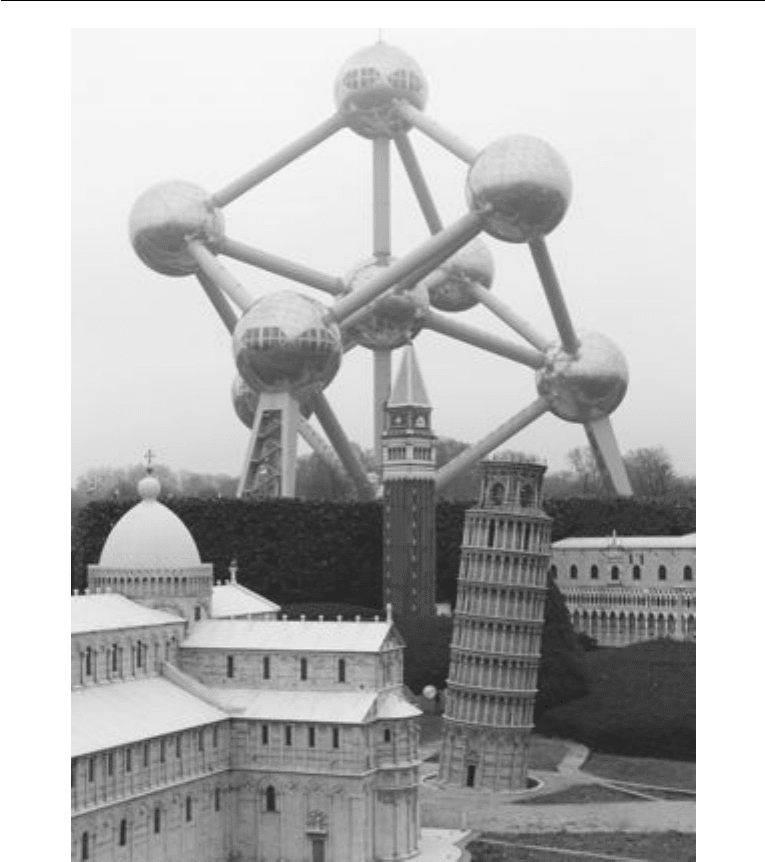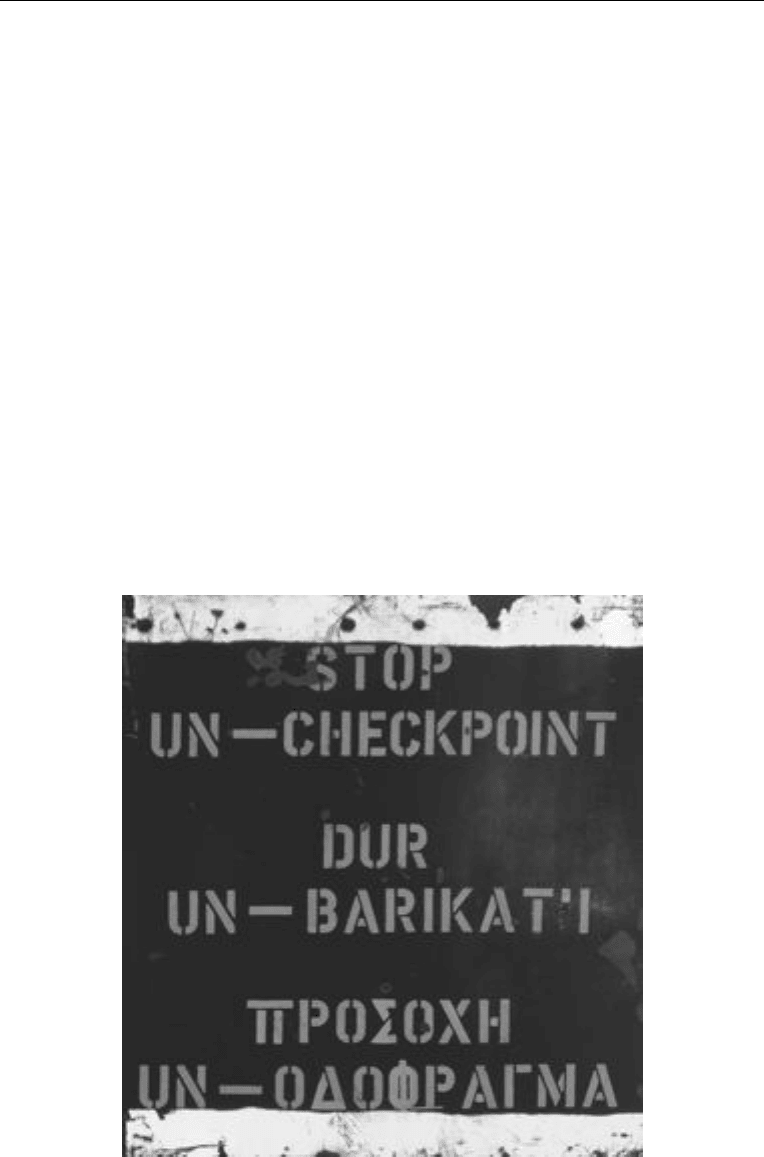Pavlac B.A. A Concise Survey of Western Civilization: Supremacies and Diversities throughout History
Подождите немного. Документ загружается.


366
CHAPTER 15
soon became the Soviet equivalent of Vietnam, as Muslim warriors (mujahedeen)
resisted the atheistic communists. Fighting a guerrilla war in difficult terrain and
supplied by another superpower (the United States), the mujahedeen kept the Rus-
sian occupying forces in turmoil.
Second, a number of labor strikes in Soviet-dominated Poland in late summer
1980 sparked the labor union movement called Solidarity. An ordinary worker,
the mustachioed Lech Wałesa, became the symbol of the conflict as he organized
striking workers from the barricades. The need for workers in a socialist state to
form a union for their own self-protection showed the failures of Soviet socialism.
The Russians, though, made Polish authorities declare martial law in December
1981, which pushed the movement underground and Wałesa under house arrest.
Both actions made the Soviet Union and its system look both oppressive and incom-
petent.
Third, new leadership in the West became determined to take a harder line
against Soviet expansionism. In Great Britain the Conservative Party’s new prime
minister, Margaret Thatcher (r. 1979–1990), disliked socialism in all its forms. She
began to scale back the British welfare state, reprivatizing many businesses and
industries and breaking unions. She also sharply criticized the totalitarian state of
the Soviet Union. In 1981, the former movie star Ronald Reagan (r. 1981–1989)
became president of the United States. He resolved to resist Soviet expansionism
and even threatened the U.S.S.R., which he called an ‘‘evil empire,’’ with the possi-
bility of World War III. Some Americans were shocked that the Reagan administra-
tion could suggest that a nuclear war with the Soviet Union was winnable, without
mutually assured destruction. Reagan also proposed the Strategic Defense Initiative
for a new high-tech antimissile system to shield the United States from ICBMs. Since
the technology for such a program was decades away from being invented, much
less activated, critics named it ‘‘Star Wars’’ after the popular science-fiction film.
Even if this antimissile system could have been built, it would have left America’s
allies in Europe defenseless against Russian mid-range missiles. To counter this
threat, Reagan and NATO leaders installed mid-range nuclear weapons in Western
Europe. Many Western citizens protested, their resentment of American domination
outweighing their fear of Russian invasion.
Reagan also continued the buildup of conventional armed forces of ships,
weapons, and soldiers in an effort to prevent possible Russian aggression anywhere.
The vast U.S. economy could afford this expensive effort, although the country went
deeply into debt to do so. The United States went from being the biggest creditor
nation in the world to the biggest debtor nation during Reagan’s presidency.
Fourth, America became more concerned about possible Soviet expansionism
in Central America, most notably in Nicaragua. Since the U.S. Marines withdrew
from their last occupation of the country in 1933, the Somoza family had ruled as
authoritarian dictators. Left-wing insurgents called Sandinistas stepped up their
revolt after the Somoza government mismanaged recovery from a major earthquake
in 1979. With Cuban and Soviet support, the Sandinistas drove Somoza from power
and created a socialist state.
The Reagan administration disliked communist influence in Nicaragua so much
that its officials defied and lied to the U.S. Congress, which did not want to inter-
PAGE 366.................
17897$
CH15 10-08-10 09:40:50 PS

INTO THE FUTURE
367
vene. They began to secretly finance the right-wing Contras to start their own coun-
terinsurgency. Depending on the point of view, one side’s terrorists were the other
side’s ‘‘freedom fighters.’’ The Reagan administration financed the Contras’ opera-
tion by illegally selling weapons to Iran, even though the United States considered
that country an international threat. The brief Iran-Contra Affair exposed the secret
deals but left Reagan’s authority intact. His military also defied international law by
mining Nicaragua’s harbors, technically an act of war. In the end, the leftist regime
fell not from bullets but by the ballot box. In 1990, the Sandinistas allowed free
elections supervised by international observers. They lost, they surrendered power,
and Nicaragua established a tentative democracy. The Sandinistas remained as a
political party, which has since won elections.
The Cold War finally ended in the 1990s after Mikhail Gorbachev (r. 1985–
1991) became secretary general of the Communist Party in the Soviet Union. He
saw the flaws and corruption of the centralized communist system and attempted
to reform Soviet society in order to save it. First, he promoted perestroika (restruc-
turing) to allow more free-market competition within the economy. Second, he
declared glasnost (openness). The regime reduced censorship, allowed more for-
eign travel, and imported more Western goods and entertainment. Third, Gorba-
chev allowed rival political parties to begin to organize, thus creating a true
democracy for the first time since the short-lived Russian Republic of 1917.
Despite Gorbachev’s reform efforts, his communist state crumbled around him.
The people resented their increasingly poor standard of living compared with those
of Western Europe. The transition to a market economy created shortages and
unemployment. Political reform was clumsy because the Communist Party resisted
giving up its privileged position. Finally, the use of force to keep control of the
Soviet Union’s provinces of Latvia, Lithuania, and Estonia reminded people of the
Hungarian Revolt and the Prague Spring.
The Soviet satellite states in Eastern Europe ultimately forced Gorbachev to
prove his sincerity about openness as they pushed for an end to Soviet domination.
In 1988, Hungary and Poland broke with Communism and launched reforms. In
Poland, Solidarity came to power, and Lech Wałesa became president. In 1989,
Czechoslovakia withdrew from Soviet control and underwent its Velvet Revolution,
so called because the political separation happened so smoothly and with so little
violence. The former political prisoner and playwright Va
´
clav Havel became presi-
dent. Rumania rejected the old system in a quick coup that murdered the long-
reigning dictator Nicolae Ceaus
¸
escu. Even Bulgaria elected a noncommunist gov-
ernment. Gorbachev finally decided against trying to uphold the status quo through
force and violence. As a result, the satellite system collapsed without much blood-
shed (see figure 15.1).
The most important sign of the Cold War’s end was the reunification of Ger-
many in 1990. The East German hard-liners began to lose control as East German
citizens began fleeing across the new open border between Hungary and Austria in
August 1989. Through Austria they reached West Germany, where they were wel-
comed as citizens with full and expansive social benefits. At home in East Germany,
mass demonstrations organized by churches also began to seek openness. The
Communist dictator of many years was deposed, and moderates tried to find new
PAGE 367.................
17897$
CH15 10-08-10 09:40:50 PS

368
CHAPTER 15
Figure 15.1. The statues of communist founders
Marx and Engels were relegated to a museum after the
Cold War.
directions. When a Communist bureaucrat broadcast on television in the evening
of 9 November 1989 that some travel restrictions would be lifted, thousands of
hopeful East Germans began to gather at crossing points at the Berlin Wall. They
talked the guards into letting them through. By the next morning there was no
sealing up the wall again. Indeed, the most potent symbol of the conflict, the Berlin
Wall, was soon pounded into rubble as souvenirs for tourists. Within a year, the
West German political leadership negotiated unification. On 3 October 1990, the
Communist East German state officially disappeared, absorbed into the Federal
Republic of Germany.
In 1991, a failed coup by Communist hard-lin ers in the Soviet Union led to the
defeat of Gorbac hev, but not of the reforms. By 1992, the Soviet Union was history.
The Russian Federation emerged as a state, loosely linked with a few former republics
from the U.S.S.R. to lead a so-called Commonwealth of Independent States. This
associatio n included new nations in the Caucasus (Azerbaijan, Armenia, and Georgia,
for a time), the Turkish states in Centr al Asia (Kazak hsta n, Uzbekistan , Turkmenistan,
Kyrgyzstan , and Tajikistan), and Eastern Europe (Moldavia and By elor ussia or
Belarus). Ukraine and the Baltic states of Estonia, Latvia, and Lithuania left com-
pletely. The War saw Pact was so on gone as wel l. The Cold War was over .
PAGE 368.................
17897$
CH15 10-08-10 09:41:18 PS

INTO THE FUTURE
369
The Cold War’s resolution even reached to the Union of South Africa and its
repressive regime of apartheid. Over the years, the government had tortured politi-
cal prisoners from the African National Congress by forcing them to sit on red ants’
nests or rubbing poisonous plants into their skin. International pressure through
boycotts, absence of a communist threat, and worsening social conflicts all con-
vinced the white racist regime to dismantle apartheid. In 1990, the regime released
Nelson Mandela, leader of the African National Congress, who had been in prison
since 1962. Mandela and his party won an overwhelming victory in free and fair
elections in 1993. President Mandela (r. 1994–1999) passed a law that protected
whites’ property and advocated forgiveness rather than avenging decades of
oppression. A Truth and Reconciliation Commission granted amnesty for the perpe-
trators of cruelty and violence in return for their honest accounts. South Africans
descended from the ‘‘white’’ British and Dutch as well as the ‘‘colored’’ Indians
stayed to maintain the Western industrialized culture, although poverty and vio-
lence still plagued too many descendants of the ‘‘black’’ native South Africans.
The collapse of communism had not resulted in the pristine victory that the
West might have hoped for. During the transition from communism to capitalism,
Russia saw much of its wealth fall into the hands of a few well-connected politicians
and friends of the elites, since the rule of law and political institutions had been
insufficiently established. Pollution, job loss, and military impotence lost the nation
its superpower status. Only a few communist dictatorships, such as those in North
Korea and Cuba under Castro, still held onto their ideology, despite some eco-
nomic difficulties without subsidies from the Soviet Union.
Meanwhile, the former Soviet satellite states in Europe tried to become even
more Western in the capitalist style. Indeed, in 2004 NATO expanded to include
most former Eastern European satellite states, right up to Russia’s doorstep. The
former Warsaw Pact members of Poland, Hungary, Rumania, Bulgaria, the Czech
Republic, Slovakia, and the three former Baltic ‘‘republics’’ of the Soviet Union
(Estonia, Latvia, and Lithuania) officially entered the defensive military alliance with
the West.
Russian political influence and economic strength collapsed after the end of the
Soviet Union. Although Russia no longer posed an invasion threat to Europe, it still
wielded the nuclear weapons capable of destroying the world. President Vladimir
Putin (r. 2000–2008), a former KGB agent, concentrated power in his hands and
boosted Russian pride by promoting nationalistic feelings. The Russian Federation
clung to Chechnya, despite continuing rebellion, and resented efforts by the
Ukraine and Georgia to join NATO. Russia and Georgia’s brief war in 2008 opened
the question of whether Georgia would remain under Russian domination or
become more a part of the West. Further, too many of the states that have frag-
mented from the Soviet Empire, especially in Central Asia, established mini-dicta-
torships of their own. Their new authoritarian rulers commanded with the language
of Islam and with nationalism rather than the communist rhetoric of Marx. Thus,
ethnic and nationalist hatreds were revived (see below). The world had suddenly
become much more complicated, with so many new countries with old grudges
and enduring problems.
PAGE 369.................
17897$
CH15 10-08-10 09:41:19 PS

370
CHAPTER 15
Review: How did the Cold War come to an end?
Response:
SEARCHING FOR STABILITY
As the Soviet Union was splitting apart, Europe was coming together. Europe’s ally
in the Cold War, the United States of America, remained the world’s foremost mili-
tary and economic nation, the sole superpower. Still, thousands of American troops
left Europe, and U.S. military installations shut down, no longer necessary for pre-
venting a Soviet invasion. After a thousand years of warfare in Europe, war between
Western states had become inconceivable instead of inevitable. From the fall of
Rome in the West in 476 and the failure of the Carolingians in the ninth century to
replace it, rival states had quarreled with one another in one bloody conflict after
another. The rivalries had contributed to making European states great powers, but
World War I, World War II, and the Cold War had shown the risks of mutual destruc-
tion. Military interventions by European powers were now subject to NATO and the
leadership of the United States.
So the political and economic unification of Europe continued after the Cold
War. In 1991, the Maastricht Treaty turned the European Community into the Euro-
pean Union. Seeking still further unity, especially because of the economic neces-
sity of competing with the United States and Japan, politicians aspired for the
various nations of Europe to become a United States of Europe. In 2002 the Union
established its Common Security and Defence Policy (CSDP), which began missions
to troubled countries around the world, such as the Congo, Indonesia, and Geor-
gia. Its various operations support police and courts in maintaining law and order,
monitor elections, try to prevent smuggling and piracy, and protect refugees and
civilians in areas with violent conflict.
The European Union’s greatest success remained in economics, drawing on its
original concept as the Common Market (see map 15.1). It continued to remove
trade and labor barriers between its members. Brussels’ subsidies to the poorer
member states, such as Ireland and Portugal, helped their economies to grow and
compare well with the more prosperous members, such as Germany and Italy. In
2002, a dozen competing monetary currencies from most of the Union countries,
from French franc to Italian lire to German mark, vanished into history and were
PAGE 370.................
17897$
CH15 10-08-10 09:41:19 PS

INTO THE FUTURE
371
Map 15.1. Common Market to European Union
replaced by a new common unit, the euro. By 2009, sixteen countries used the
euro as a currency, and it remained strong against its international rival, the Ameri-
can dollar.
Ongoing economic success tempted still more countries to join the European
Union. First, in 1995, the former neutral nations of Austria, Finland, and Sweden,
with their advanced Western economies, were welcomed. Next, many of the newly
freed Soviet satellites were eager to join, although they had to develop their market
economies and parliamentarian democracies before they could be fully integrated.
On 1 May 2004, the former states of communist Estonia, Latvia, Lithuania, Hungary,
Poland, the Czech Republic, Slovakia, and Slovenia, along with the island states of
Malta and (non-Turkish) Cyprus, became members. Rumania and even Bulgaria
entered the Union on 1 January 2007. Serious negotiations finally started to include
even the Muslim, yet European, country of Turkey. Some older members of the
European Union, however, doubt that Turkey is, or ever will be, ‘‘Western’’ enough.
Other obstacles slowed the path to true European unity. Some ‘‘Euroskeptics’’
saw the dangers of a vast bureaucracy in Brussels that demanded conformity and
ignored local differences. Many Europeans wanted to see more subsidiarity,
where decisions are made at the regional and local levels rather than by the Euro-
pean Commission in Brussels (see figure 15.2). While English grew more popular
as a unified lingua franca because of the power of American and British popular
PAGE 371.................
17897$
CH15 10-08-10 09:41:58 PS

372
CHAPTER 15
Figure 15.2. The Atomium built for the 1958 World’s Fair in Brussels
now dominates a park celebrating the European Union, with models of
cultural icons from all over Europe.
culture, Europeans continued to speak more than fifty different regional and local
languages and even more dialects. Some Europeans only reluctantly accepted the
new member states, afraid of the cost of supporting less-developed economies and
opening up borders to more immigration, competition from cheap labor, redirec-
tion of agricultural subsidies, or lack of ‘‘proper’’ values. Even Germany had trouble
integrating Germans from the former East Germany, especially as many businesses
in the former socialist state failed to adapt to the new capitalist economy.
The weakening of border controls permitted by the European Union made
Europe more diverse than ever, through increased emigration and immigration.
PAGE 372.................
17897$
CH15 10-08-10 09:42:31 PS

INTO THE FUTURE
373
Workers from any member state could get jobs in any other. And the borders contin-
ued to be open to many peoples of former colonial Africa and Asia. The wealth of
Europe was a magnet to poor people around the world. Foreign workers from the
Balkans, North Africa, or former colonies of a Western imperial power were settling
into the European cities and forming enclaves of non-Western cultures. Modern
communications meant they received newspapers, radio, pamphlets, and television
all in their own languages. By 2010 more than fifteen million Muslims resided in
Western European urban centers, leading some to label the continent ‘‘Eurabia.’’
The call of the muezzin from the minaret competes with the church bells from
steeples amid the traffic noise in streets. Benign neglect meant few attempts to
assimilate the newcomers, allowing the diverse immigrants to retain their own cul-
tural attitudes. Ironically, the European practice of tolerance, combined with
neglect, allowed Muslim extremists to preach intolerance and resistance to assimila-
tion.
In reaction to the growing number of non-Europeans, nationalistic parties and
perspectives grew in strength. Politicians such as Jean-Marie Le Pen in France and
Joseph Haider in Austria sought both to limit the rights of these foreigners and to
resist the control of Brussels along the way. School officials in France, Germany, and
Britain called for Muslim women and girls to stop wearing headscarves, symbols
of Muslim culture. In counterreaction, the ‘‘new Europeans’’ themselves began to
organize politically, either in new parties or by joining traditional parties (usually
either Green or Socialist).
Some immigrants, excluded from mainstream culture and meaningful employ-
ment, took out their frustration through violence. In November 2005, poor immi-
grants from North Africa and Portugal rioted over several nights in hundreds of
French cities, burning thousands of cars and torching schools around their ban-
lieues, the ghettoized districts in which they lived. In the Netherlands, men mur-
dered nationalist political candidate Pim Fortuyn in 2002 and film director Theo
van Gogh in 2004 for their alleged anti-Muslim views. Governments in Eastern
Europe and Italy passed new laws against the wandering ‘‘Gypsies’’ or Romani peo-
ple. Nation-states found it difficult to define their populations according to unified
ethnicity anymore.
Of course, Europeans had no one to blame but themselves for these immi-
grants. Europe’s colonial empires enabled Asians and Africans to move to the
mother countries. Others came to take low-paying jobs that the Europeans offered.
Every year millions more arrived because the West provided asylum or refuge from
ideologies and cruelties with which other states still oppressed their own resident
peoples. Some foreign culture began to weave its way into European sensibilities,
especially through cuisine. Curry became as standard for British food as fish and
chips, while Germans and Austrians ate do
¨
ner kebabs as an alternative to wurst.
In the homeland of Western civilization, people asked, what does a united
Europe mean? Intellectuals, especially Jacques Derrida and Michel Foucault from
France, proposed a new technique to interpret Western culture in the 1980s. Their
postmodern critique sought to undermine the Enlightenment consensus about
individual rights and progress. Postmodernists deconstructed ideas and ideologies
to show that they often represent actions of power and exploitation. Prevailing
PAGE 373.................
17897$
CH15 10-08-10 09:42:32 PS

374
CHAPTER 15
institutions use meanings to preserve their self-serving structures of profit and pres-
tige. Enthusiasm for deconstructionist methods remained mostly confined to aca-
demic circles, yet postmodern criticism contributed to uncertainty about whom to
trust.
As politicians began writing the Convention on the Future of the European
Union in 2002, some tried to enshrine the position of Christianity in the document.
Statistically, attendance at Christian churches in nominally Christian Europe had
plummeted. Some argued, nonetheless, that the Christian heritage of democracy
and freedom should be honored. Others, however, feared the domination of the
state by various churches, and the marginalization of the millions of non-Christians
(atheists, Muslims, Hindus, Buddhists, and Jews) who now lived in a diverse
Europe. In any case, the cumbersome and complicated constitution failed to win
endorsement by the French and Dutch voters in spring 2005.
Ethnic minorities from Eastern Europe, former colonies, and all over the world
continued to come to Western European nations and settle down. Some were seek-
ing amnesty for political or cultural persecution. Others wanted a job. Since the
West had become supreme as a political and economic force in the world, the
peoples of the world naturally migrated to prosperous Western states to profit from
that power. Would they be integrated, like metal in a melting pot, or stay separated,
as fruits in a basket? Would these peoples from Asia and Africa become westernized,
or would they change the West?
Review: How did the European Union attempt to provide a new economic and political
basis separate from the United States?
Response:
AN UNEXPECTED REVIVAL
At the Cold War’s conclusion some pundits predicted that the collapse of commu-
nism meant a victory for liberal democracy and the opportunity for prosperity
under capitalism. Even while the Cold War drove many Europeans together, some
peoples divided over their differences. The claims of communism to unite workers
had not weakened ethnic distinctions. Nationalism remained a potent political ide-
PAGE 374.................
17897$
CH15 10-08-10 09:42:32 PS

INTO THE FUTURE
375
ology. While the Cold War’s end drained wars of their communist vs. capitalist
energy, conflicts were yet empowered by cultural and tribal rivalries.
Two areas of British imperialism illustrate how nationalist conflicts continued
during the Cold War. In Cyprus the deep divisions between ethnic Greeks (about
80 percent of the population) and Turks (the other 20 percent) degenerated into
terrorist attacks, especially by those who wanted unification with Greece. Britain
pulled out in 1959, but the new Cyprus was forbidden to unify with Greece. Greeks
and Turks never quite managed to live peaceably, relying on UN peacekeepers.
In 1967, though, Greece’s anti-Communist military dictatorship thought annexing
Cyprus would regain it some support lost after shooting student protestors in Ath-
ens. In a preemptive strike, Turkish troops occupied the northern third of Cyprus.
Tens of thousands of ethnic Greek Cypriots fled to the south. The two NATO allies,
Greece and Turkey, just barely managed to avoid war (see figure 15.3). The whole
island became a member of the European Union in 2004, but Union authority does
not quite apply to the northern third under Turkish rule.
Second, Northern Ireland, which remained under British rule after indepen-
dence for the rest of Ireland, experienced violence between Protestant and Roman
Catholics. Roman Catholics in Northern Ireland saw themselves as oppressed. They
often lived in ghettoes, had worse jobs, were paid less, and were allowed fewer
political rights than Irish Protestants. So the Irish Roman Catholics began demon-
strating against the majority of Protestants and the British government. With a deter-
Figure 15.3. A sign by peacekeepers of the United Nations
marks the division of Cyprus.
PAGE 375.................
17897$
CH15 10-08-10 09:42:44 PS
